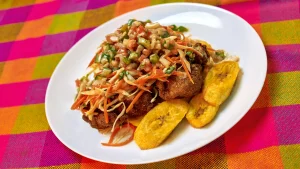Louvabagu, The Far Other Side

Rafael Murillo Selva, together with the Garifuna community of Guadalupe Colón, Honduras, organized the theater group «Superación» to stage the theatrical play «Louvabagu,» a true ethnological and historical testimony of their culture, resulting from the successive fusions between Arawaks, Caribs, and Africans.
An explosion of music, color, rhythm, culture, and history, centered around the fundamental themes of daily life in the town of Guadalupe, through numerous scenes derived from their ceremonies and dances, presented against a vibrant set designed by the Guadalupanos themselves.
Finally, the warrior dance, intense and spectacular, liberates the Garifuna people from their neocolonial tendencies, a victorious chant that reaffirms their spiritual strength and racial pride.

The Work
«Loubavagu,» now starring direct descendants of the original protagonists, tells the adventures of the Garifuna people in San Vicente, the actions of their hero Satuyé, and their subsequent expulsion in 1796 to Honduras.
Initially, the production presents the origin of the Garifuna people: in 1635, a ship carrying African slaves to Brazil shipwrecked near the shores of Yurumei Island (San Vicente). One of the survivors joins a native Carib woman, and they have three children, including Satuyé, considered the first defender (hero) of Garifuna dignity.
From its genesis, this community resisted slavery. This is the reason why Satuyé died and why a group of war survivors were deported and eventually settled on the shores of Honduras.
Their arrival in what would become their new homeland took place on April 12, 1797. In Honduras, the Garifuna people have faced the same problems as their ancestors: marginalization, abuse, and even violence to take away their land.
In its first stage (1980-1997), the play was witnessed (including on television) by approximately one million people.
The Critique
Loubavagu, three decades after its premiere, remains relevant. Many of the rights they have fought for centuries are still distant, but, as reflected in the play, their joy has never been taken away from them.
Since its early performances, critics have labeled this play as revolutionary, a term that has been distorted and demonized in present-day Honduras. But Loubavagu is the voice of protest of a marginalized people fighting for the recognition of their race, customs, religion, and identity.
A struggle that continues into the 21st century, as political, religious, and social structures have yet to repay their debt to «minor» communities such as the Garifuna, Tolupanes, Chortís, Miskitos, Pech, etc. The music survives through all the eras recreated in «Loubavagu.»
Biography of Rafael Murillo Selva Rendón
Despite all the injustices suffered by the Garifuna, their «festive» spirit always shines through in facing adversity. Although Murillo Selva avoids exploiting Garifuna «folklorism,» which some pseudo-artists attempt to use to become defenders and promoters of Garifuna culture.
«Loubavagu» not only brings historical stages of the Garifuna people to the stage but also delves into internal critique. A critique of Garifuna individuals who betray their own people, who forget their historical memory, who abandon their roots, customs, beliefs, and even their language.


